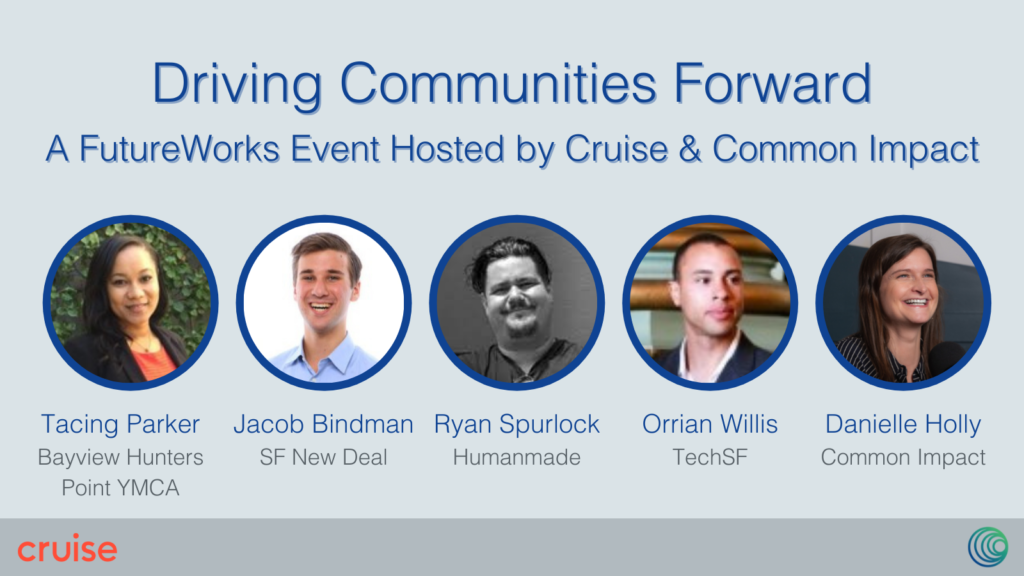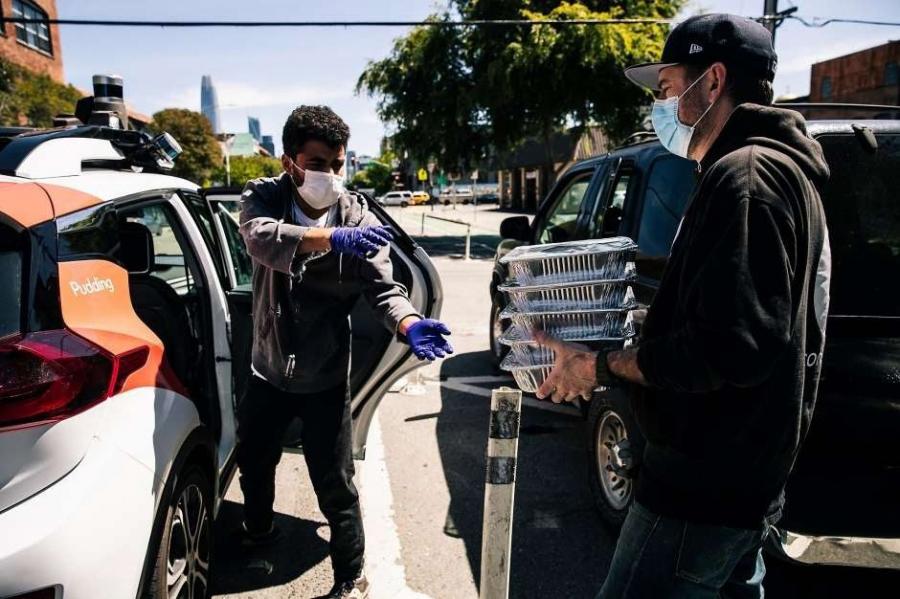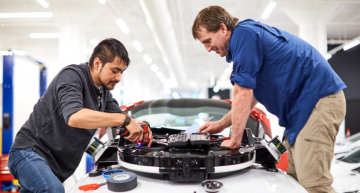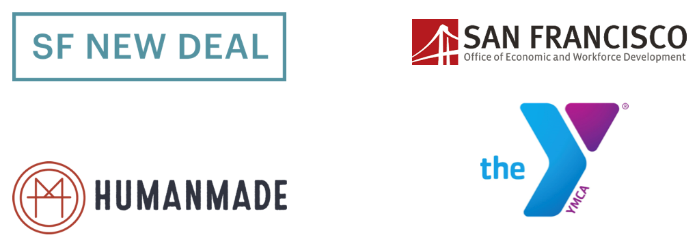
The pandemic continues to widen the opportunity gap and adversely impact students and job-seekers, especially those who already faced systemic barriers to career success. We need innovative, collaborative, community-driven solutions to ensure that communities that have been disproportionately affected can have equal access to economic mobility. Those solutions can often feel amorphous or unattainable, but – if you look closely at the work of local organizations – there are powerful collaborations that are meaningfully building equity every day.
Recognizing this, Common Impact and Cruise, a global zero-emission autonomous vehicle company, recently partnered with San Francisco-based nonprofits and civic organizations for its second annual “Driving Communities Forward,” a discussion on how cross-sector partnerships and thoughtful, holistic workforce development programs can create more equitable pathways to opportunity. (Read about the solutions shared at the inaugural Driving Communities Forward.) The conversation was part of FutureWorks, a Cruise social impact program designed to bring together employees and community members to exchange ideas, open networks, and support students and workers from underrepresented backgrounds. This year’s FutureWorks Week convened more than 230 individuals for three virtual events. FutureWorks represents Cruise’s ongoing commitments to creating a more equitable future and to actively supporting local nonprofits that are developing talent pipelines for those historically underrepresented in the emerging tech and transportation fields. Here’s what this group had to share.
“We all know that – even before the pandemic – while talent is equally distributed, opportunity is not.” – Amanda Lenaghan, Head of Social Impact, Cruise
Inequity, the First Pandemic
COVID-19 isn’t the only crisis we’re up against right now. Tacing Parker, Senior Executive Director of the Bayview Hunters Point YMCA, which aims to strengthen the foundations of its neighborhood through programs for youth development, education, and workforce development, called COVID-19 a “second pandemic” following the pandemics of racism, inequity, and poverty, all of which were compounded by spikes in underemployment and unemployment, food insecurity, isolation and the mental health crisis, and the digital divide. Gaps in digital literacy and access to technology meant that 50% of students in the local school district were not able to log in for remote school and were falling behind their peers. These gaps have lifelong impacts and create discrepancies in learning and opportunities that will be challenging, if not impossible, to close in years to come. Bayview Hunters Point YMCA recognizes that today’s students are tomorrow’s workforce. They used this moment to expand their education and workforce development programs, putting an emphasis on reaching young people sooner by exposing them to careers in technology during and before high school.
A Community-First Approach

Since early 2020, SF New Deal has partnered with Cruise through its Pledge 1% program, Cruise For Good, to deliver more than 1.5 million meals to low-income communities. “More than anything else, what allowed us to scale so quickly was partnering with individuals and organizations that have done this work for decades in San Francisco and have a really acute understanding of what the problems are and the solutions to those challenges,” said SF New Deal Co-Founder Jacob Bindman. This partnership isn’t focused on creating brand-new solutions, but instead taking a community-first approach and listening to individuals impacted on what they needed.
“When we talk about root causes, what we’re really talking about is capacity building,” Bindman said. On the individual level, it’s about recognizing that hunger is part of an ecosystem of challenges that must be addressed; it’s difficult to focus on education, upskilling, housing, or childcare when one’s thoughts are consumed by where their next meal is coming from. He added, “Certainly, the work that SF New Deal does to provide meals to individuals who are food insecure is important work that we will continue to do, but we also must acknowledge that delivering 50,000 meals this week does really little to get us to a spot where we don’t have to deliver 50,000 meals next week.”
Breaking Down Barriers to Career (and Economic) Advancement

Ryan Spurlock, Founder and Executive Director of Humanmade, San Francisco’s first advanced manufacturing training center providing workforce development programming, shared: “While we do train individuals in hard skills, it’s really barrier mitigation and soft skills that define our success.” During the pandemic, Humanmade wanted to help participants with the challenges that may impact their ability to succeed in the classroom. They instituted in-class case managers as an additional safety net on top of instructor support, and Cruise connected Humanmade with SF New Deal to provide daily food deliveries to participants so they could focus on their skills development. Humanmade’s biggest takeaway? Look at all the barriers an individual faces: “If we’re going to meet people where they are and support them getting to where they want to be, we need to understand where that is,” said Spurlock.
Cross-Sector Partnerships for Holistic Solutions
TechSF is an initiative of the San Francisco Office of Economic & Workforce Development to fund technology training programs that upskill individuals from underrepresented communities and bring them into careers in technology. According to TechSF Manager Orrian Willis, the economy has been K-shaped for a long time, and the pandemic only exacerbated inequalities in academic and economic achievement. Unemployment rates have improved recently, but job growth isn’t benefitting Black Americans and women with children proportionately. “It’s very clear that they have the aptitude to make it in tech but there are existing network gaps that don’t allow them the opportunity to prove themselves,” said Willis.
TechSF’s programs have yielded high success rates, but there is no magic solution. “One thing we say in workforce development is: We cannot train ourselves out of this problem,” noted Willis. “Without public-private partnerships, we will not achieve our collective goals surrounding an equitable economic recovery.” Spurlock agreed, adding: “We can train people and get them qualified; however, if we don’t have commitments from workforce partners to take on someone with a lesser skill set than someone with a four-year degree, this program does not work… It only works with commitments from the employers who want to help level the playing field and reset the opportunities that people have been given.”
Taking Action: It’s Up to All of Us
To truly address COVID-19 recovery and the opportunity gap, we must keep collaboration, equity, and the human experience at the center of the conversation. “We all hear these headlines and want to get involved in these challenges, but understanding what they look like day-to-day for the individuals who are being impacted is one of the most powerful things that we can bring and talk about,” said Common Impact CEO Danielle Holly. There is a steep road to recovery ahead for many within our communities and it’s going to take all of us to continue to make strides toward our collective goals.
Companies: To be part of the movement to build more equitable and resilient communities, join TechSF or learn how you can support the work of Bayview Hunters Point YMCA, SF New Deal, and Humanmade. Check out Common Impact’s corporate services and resources for more ways to create meaningful change.
Individuals: Listen to what nonprofits and communities need and how you can best plug in, whether that’s by donating, volunteering, or spreading the word about their work. You can add value in ways you might not realize!




